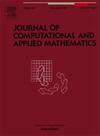Two inertial-relaxed hybridized CG projection-based algorithms for solving nonlinear monotone equations applied in image restoration
IF 2.1
2区 数学
Q1 MATHEMATICS, APPLIED
Journal of Computational and Applied Mathematics
Pub Date : 2025-02-06
DOI:10.1016/j.cam.2025.116546
引用次数: 0
Abstract
In this paper, we introduce two inertial-relaxed hybridized conjugate gradient projection-based algorithms for solving nonlinear monotone equations. Compared to traditional inertial-relaxed algorithms for solving such nonlinear equations, our algorithms utilize three-step iterative information to generate inertial iterates. The search directions of two proposed algorithms each include a flexible non-zero vector and feature their own self-adaptive hybrid structure to enhance their adaptability. Both search directions satisfy the sufficient descent and trust region properties, eliminating the need for additional conditions. In the theoretical analysis of global convergence and convergence rate results, both proposed algorithms exhibit similarities. We begin by using the first proposed algorithm to establish the global convergence without requiring the Lipschitz continuity assumption. Furthermore, under additional assumptions, we demonstrate the convergence rate of this algorithm. To evaluate their effectiveness, we conduct comparative tests against existing algorithms using nonlinear equations. Moreover, the practicality of the two proposed algorithms is shown through applications on image restoration problems.
求助全文
约1分钟内获得全文
求助全文
来源期刊
CiteScore
5.40
自引率
4.20%
发文量
437
审稿时长
3.0 months
期刊介绍:
The Journal of Computational and Applied Mathematics publishes original papers of high scientific value in all areas of computational and applied mathematics. The main interest of the Journal is in papers that describe and analyze new computational techniques for solving scientific or engineering problems. Also the improved analysis, including the effectiveness and applicability, of existing methods and algorithms is of importance. The computational efficiency (e.g. the convergence, stability, accuracy, ...) should be proved and illustrated by nontrivial numerical examples. Papers describing only variants of existing methods, without adding significant new computational properties are not of interest.
The audience consists of: applied mathematicians, numerical analysts, computational scientists and engineers.

 求助内容:
求助内容: 应助结果提醒方式:
应助结果提醒方式:


